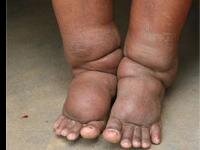Lymphatic Filariasis

Lymphatic filariasis (LF), commonly known as elephantiasis is a mosquito-borne parasitic disease caused by thread-like worms of the genus Wuchereria and Brugia. Long-term infection progressively results in profound disfigurement and pain in the limbs and genitals as the parasites lodge in the lymphatic system causing severe swelling, secondary bacterial infections, and fever.
Though the disease is usually irreversible, there is now evidence that treatment can alleviate symptoms of patients suffering from the disease. However, the primary goal of the Global Alliance to Eliminate LF as a public health problem is to stop the spread of infection by reducing worm larvae in the blood of infected persons so that mosquitoes cannot transmit the worms from one human to another. The donation of Mectizan and albendazole is part of the strategy as the combination kills off the microfilariae. WHO recommends a single, annual dose over five years of Mectizan and albendazole in onchocerciasis-endemic countries in Africa and in Yemen, or Mectizan and diethylcarbamazine in all other LF-endemic countries to interrupt transmission.